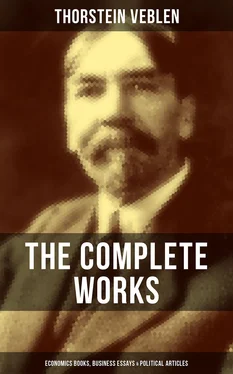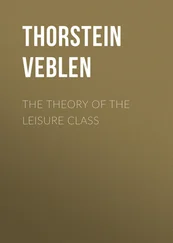Hereby the technological basis for a pecuniary control of industry is given, in that the “roundabout process of production” yields an income above the subsistence of the workmen engaged in it, and the material equipment of appliances (crops, fruit-trees, live stock, mechanical contrivances) binds this roundabout process of industry to a more or less determinate place and routine, such as to make surveillance and control possible. So far as the workman under the new phase of technology is dependent for his living on the apparatus and the orderly sequence of the, “roundabout process” his work may be controlled and the surplus yielded by his industry may be turned to account; it becomes worth while to own the material means of industry, and ownership of the material means in such a situation carries with it the usufruct of the community’s immaterial equipment of technological proficiency.
The substantial fact upon which the strategy of ownership converges is this usufruct of the industrial arts, and the tangible items of property to which the claims of ownership come to attach will accordingly vary from time to time, according as the state of the industrial arts will best afford an effectual exploitation of this usufruct through the tenure of one or another of the material items requisite to the pursuit of industry. The chief subject of ownership may accordingly be the cultivated trees, as in some of the South Sea islands; or the tillable land, as happens in many of the agricultural communities; or fish weirs and their location, as on some of the salmon streams of the American north-west coast; or domestic animals, as is typical of the pastoral culture; or it may be the persons of the workmen, as happens under divers circumstances both in pastoral and in agricultural communities; or, with an advance in technology of such a nature as to place the mechanical appliances of industry in a peculiarly advantageous position for engrossing the roundabout processes of production, as in the latterday machine industry, these mechanical appliances may become the typical category of industrial wealth and so come to be accounted “productive goods” in some eminent sense.
The institutional change by which a pecuniary regulation of industry comes into effect may take one form or another, but its outcome has commonly been some form of ownership of tangible goods. Particularly has that been the outcome in the course of development that has led on to those great pecuniary cultures of which Occidental civilisation is the most perfect example. But just in what form the move will be made, if at all, from free workmanship to pecuniary industry and ownership, is in good part a question of what the material situation of the community will permit. In some instances the circumstances have apparently not permitted the move to be made at all. The Eskimo culture is perhaps an extreme case of this kind.
The state of the industrial arts among them has apparently gone appreciably beyond the technological juncture indicated above as critical in this respect. It involves a considerable specialisation and accumulation of appliances, such as boats, sleds, dogs, harness, various special forms of nets harpoons and spears, and an elaborate line of minor apparatus necessary to the day’s work and embodying a minutely standardised technique. At the same time these articles of use, together with their household and personal effects, represent something appreciable in the way of portable wealth. Yet in their economic (pecuniary and industrial), domestic, social, or religious institutions the Eskimo have substantially not gone beyond the point of customary regulation commonly associated with the simpler, hand-to-mouth state of the industrial arts typical of the palaeolithic savage culture. And this archaic Eskimo culture, with its highly elaborated technology, is apparently of untold antiquity; it is even believed by competent students of antiquity to have stood over without serious advance or decline since European palaeolithic times - a period of not less than ten thousand years. 98The causes conditioning this “backward” type of culture among the Eskimo, coupled with a relatively advanced and extremely complete technological system, are presumed to lie in their material surroundings; which on the one hand do not permit a congestion of people within a small area or enable the organisation and control of a compact community of any considerable size; while on the other hand they exact a large degree of cooperation and common interest, on pain of extreme hardship if not of extinction.
More perplexing at first sight is the case of such sedentary agricultural communities as the Pueblo Indians, who have also not advanced very materially beyond the simpler cultural scheme of savage life, and have not taken seriously to a system of property and a pecuniary control of industry, in spite of their having achieved a very considerable advance in the industrial arts, particularly in agriculture, such as would appear to entitle them to something “higher” than that state of peaceable, non-coercive social organisation, in which they were found on their first contact with civilised men, with maternal descent and mother-goddesses, and without much property rights, accumulated wealth or pecuniary distinction of classes. Again an explanation is probably to be sought in special circumstances of environment, perhaps re-enforced by peculiarities of the racial endowment; though the latter point seems doubtful, since both linguistically and anthropometrically the Pueblos are found to belong to two or three distinct stocks, at the same time that their culture is notably uniform through out the Pueblo region, both on the technological and on the institutional side. The peculiar material circumstances that appear to have conditioned the Pueblo culture are (a) a habitat which favours agricultural settlement only at isolated and widely separated spots, (b) sites for habitation (on detached mesas or on other difficult hills or in isolated valleys or canyons) easily secured against aggression from without and riot affording notable differential advantages or admitting segregation of the population within the pueblo, (c) the absence of beasts of burden, such as have enabled the inhabitants of analogous regions of the old world effectually to cover long distances and make raiding a lucrative, or at least an attractive enterprise.
These, and other peculiar instances of what may perhaps be called cultural retardation, indicate by way of exception what may have been the ruling causes that have governed in the advance to a higher culture under more ordinary circumstances, - by “ordinary” being, intended such circumstances as have apparently led to a different and, it would be held, a more normal result in the old world, and particularly in the region of the Western civilisation.
In the ordinary course, it should seem, such an advance in the industrial arts as will result in an accumulation of wealth, a considerable and efficient industrial equipment, or in a systematic and permanent cultivation of the soil or an extensive breeding of herds or flocks, will also bring on ownership and property rights bearing on these valuable goods, or on the workmen, or on the land employed in their production. What has seemed the most natural and obvious beginnings of property rights, in the view of those economists who have taken an interest in the matter, is the storing up of valuables by such of the ancient workmen as were enabled, by efficiency, diligence or fortuitous gains, to produce somewhat more than their current consumption. There are difficulties, though perhaps not insuperable, in the way of such a genesis of property rights and pecuniary differentiation within any given community. The temper of the people bred in the ways of the simpler plan of hand-to-mouth and common interest does not readily bend itself to such an institutional innovation, even though the self-regarding impulses of particular members of the community may set in such a direction as would give the alleged result. 99
Читать дальше












